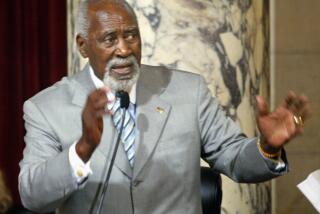Top Aides to Clinton Chipping In to Defray Cost of Helicopter Outing : White House: Thirteen officials will pass the hat to help colleague pay for flight that led to his ouster. Spokesman admits that a second craft was involved.
- Share via
WASHINGTON — White House anger over an aide’s golf outing by helicopter seemed to cool rapidly Friday, as top aides agreed to help the fired administrative chief reimburse the government for the cost of his ride.
As a “gesture of friendship,” 13 top White House officials--virtually the entire senior rank--committed to help the former chief of administration pick up the tab, said Mark D. Gearan, the director of communications. By one rough estimate, that bill could run to about $20,000.
The agreement came as White House efforts to defuse a public relations debacle were set back by their admission that a second Marine helicopter also had gone on the outing that took Watkins and two others to an afternoon of golf Tuesday at the Holly Hill Country Club in Frederick, Md.
After denying earlier that any other helicopters were part of the trip, Gearan conceded that there was a second helicopter. While the second aircraft’s purpose was to conduct a “training mission,” he said it would “probably not” have been along but for Watkins’ plans to spend the afternoon at the course.
The disclosure of the trip Thursday prompted President Clinton to seek Watkins’ resignation. Clinton said he was “very angry” at news about his longtime Arkansas friend and business associate and promised that private money would be used to reimburse the government for the trip. Some aides immediately expressed the view that Watkins’ clumsy mistake had hurt their President at a moment when he could ill afford any setbacks.
But announcement of plans for the White House contributions appeared to add a dose of moral ambiguity to the episode, forcing officials to deny that the top aides were not taking the infraction seriously. To place that interpretation on the fund-raising effort would be “a misread of the situation,” Gearan told reporters.
The trip reawakened voter outrage on radio and television talk shows across the country Friday. But at the White House, anger was barely evident in a series of letters, released late in the day, from Clinton, Watkins and Thomas (Mack) McLarty, the White House chief of staff.
Clinton made only the most passing reference to the reason for Watkins’ departure, saying: “I write to accept your resignation and to say that I understand your reasons for submitting it.”
He praised Watkins’ “great vigor and effectiveness” and thanked him for improvement in the White House telephone and computer systems. “Hillary and I will never forget the loyal friendship you and Ileene (Watkins’ wife) have given to us over the years.”
For his part, the 52-year-old Watkins insisted that “there simply was no effort on my part to use the White House or military equipment for personal or recreational purposes. My sole purpose was determining how you could utilize Camp David more frequently and enjoy the same opportunity for relaxation in Maryland that you sometimes get in Washington.”
McLarty called the golf trip “an unfortunate error.” But he said that he, too, believed the trip was made in “good faith, in the belief you were serving the President’s interest as part of your official duties.”
The aides who have agreed to contribute are McLarty, presidential advisers David Gergen and George Stephanopoulos, Gearan, deputy chiefs of staff Phillip Lader and Harold M. Ickes, economic adviser Robert E. Rubin, counsel Lloyd N. Cutler, national service director Eli Segal, congressional relations director Pat Griffin, Cabinet secretary Christine Varney, public liaison chief Alexis Herman and domestic policy director Carol Rasco. Gearan said it was unclear if the Clintons would contribute.
Officials are awaiting word from the Pentagon on the size of the total bill for the use of the helicopters, which cost $2,380 an hour to operate. Gearan said it was undecided how the cost would be shared but said it is certain that Watkins and Alphonso Maldon, the White House military office head who joined Watkins for the outing, will “be paying something.”
A third golfer, Navy Cmdr. Richard Cellon, who directs operations at Camp David, was judged to have no responsibility for the trip and will not pay anything. The positions of Watkins and Maldon give them authority over Cellon.
Watkins spent his last day at the White House on Friday and surrendered his pass at the close of business. Maldon, a retired Army officer who formerly worked in the White House congressional relations office, will be reassigned, although it is not clear where.
Gearan said that the White House counsel’s office had reviewed the logs of Marine helicopter flights and had found no evidence of other infractions. Officials are “not aware of any other instances,” he said.
Gearan said that the Marine helicopter had taken Watkins and Maldon from Bolling Air Force Base near Washington to Camp David, where Watkins took part in a meeting that lasted about 30 minutes and conducted a “site inspection” of new construction at the camp. Then the helicopter dropped the three at Holly Hill and headed back to the air base.
Meanwhile, the second helicopter continued its mission, which took it through various sections of western Maryland and to Gettysburg, Pa. Two other golfers at the course said they saw the second aircraft join Watkins’ aircraft after the golfers had been picked up, although Gearan indicated that the two helicopters did not fly together on the return trip.
Gearan was asked why reporters earlier had been told that the trip was devoted to scout out a potential golfing site for the President. “That was the best information received at the time from David and Al Maldon,” he said.
Although Clinton showed a flash of anger during a press conference Thursday afternoon, one aide said that he had not expressed anger to Watkins. On the contrary, he had been been sympathetic to the plight of an associate who had worked with him on his campaigns and in the White House and had arranged their participation in a personal investment.
Former Republican aides noted that in the George Bush and Ronald Reagan administrations only presidents used the helicopters. This was both because of the cost of operation and because the copters were viewed as part of the ceremonial trappings that should be reserved for the chief executive.
Marlin Fitzwater, press secretary to both previous presidents, recalled that Reagan Chief of Staff Donald T. Regan once had been refused permission to use one of the helicopters when he had asked to be flown to Bethesda Naval Medical Center to visit the ailing Reagan. As vice president, Bush once was offered use of a helicopter but turned it down, Fitzwater said.
More to Read
Get the L.A. Times Politics newsletter
Deeply reported insights into legislation, politics and policy from Sacramento, Washington and beyond. In your inbox twice per week.
You may occasionally receive promotional content from the Los Angeles Times.











